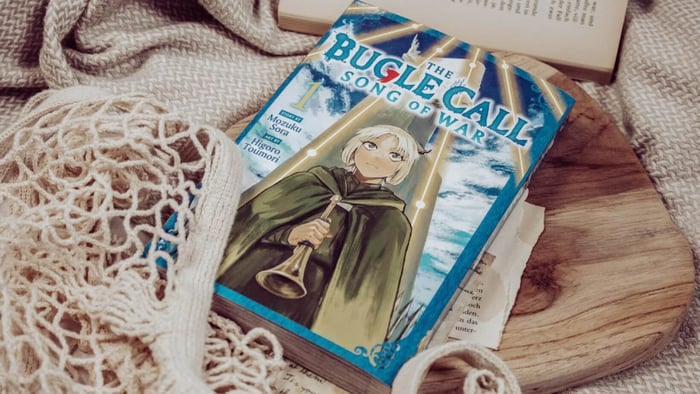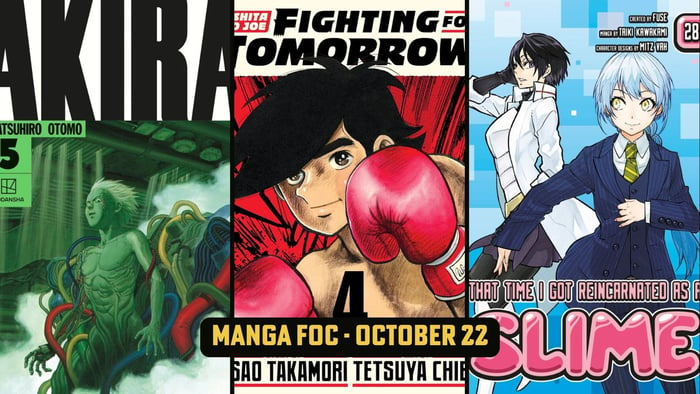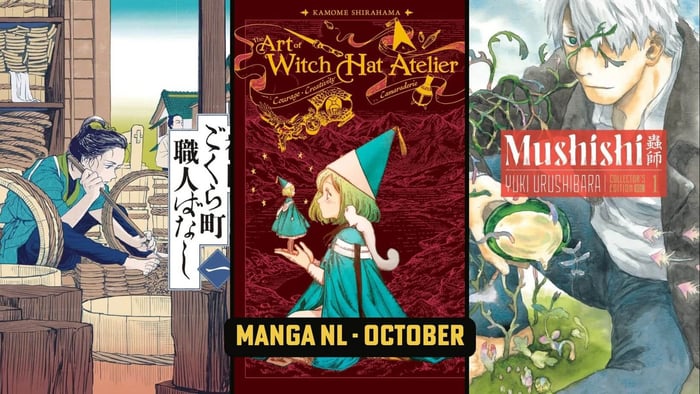With “The Bugle Call: Song of War,” the duo Mozuku Sora (story) and Higoro Toumori (art) present an opening that blends classic dark fantasy elements with a poetic core. The manga is published in Japan in Jump SQ (Shueisha), known for titles like Blue Exorcist and Claymore, and released in the U.S. by VIZ. It marks the debut work of the two artists, who previously worked together in the IT industry before deciding to dedicate themselves fully to storytelling.
In Japan, the series currently spans twelve volumes (as of October 2025) and is in its final arc.
How was it?
At the center stands Luca, a 14-year-old orphan who has grown up in a mercenary troop since childhood. The world he lives in is torn apart by war, hunger, and religious conflict. While his comrades plunder, burn, and kill, Luca clings to a dream that seems to have no place in this world: he wants to make music. As a clarionist-meaning a horn player-he transmits commands on the battlefield without having to fight himself. But unlike others, he perceives a hidden magic in the sounds: Luca can see the music.
His life changes when his latent gift fully awakens for the first time. On the battlefield, his melodies manifest as lines of light that coordinate the soldiers’ movements. This visual and strategic magic, a kind of musical tactics, saves his unit and at the same time makes him the target of a higher power. After his troop’s defeat, Luca is taken in by the Pontifex, the spiritual leader of the so-called Spire Empire. The Pontifex offers him a pact: he is to fight in the name of the Church and defeat its enemies. In return, he may study music and will be granted the freedom to live peacefully after the war.
Luca is not a typical fantasy hero. He is driven neither by greed for power nor by revenge, but by a deep aversion to violence. This pacifist stance stands in stark contrast to the world around him, which thrives on bloodshed. His character recalls the protagonists of classic anti-war tales: an observer who unwillingly becomes part of the very system he despises. Mozuku Sora uses the fantasy framework to explore themes such as guilt, responsibility, and humanity. Here, war is not merely a backdrop but a test of the characters’ integrity. Especially the relationship between Luca and his adoptive father Gerhart, the leader of the mercenary band, illustrates how ambivalent moral action can be in a world where survival has become the only virtue. Gerhart recognizes Luca’s potential, nurtures him, and yet remains a prisoner of his own cruelty.
In the second part of the volume, the narrative horizon expands. The reader learns of the so-called "Branchus," people born with branch- or horn-like growths who thereby possess special powers. Their existence is kept secret by the Church, while their abilities are systematically exploited in war. Within this religiously charged power structure, Luca henceforth serves as a tool.
The worldbuilding of The Bugle Call is not entirely original, and inspirations from Vinland Saga and Berserk are apparent, but overall the world is carefully constructed. Nine gigantic towers-the "Spires"-are said to be the source of magical power. A holy war is being waged around them, intertwining religious, political, and personal motives. Sora and Toumori thus create a world shaped by medieval aesthetics yet developing its own mythology whose inner logic quickly becomes tangible.
After a very strong start, however, the narrative in my view loses some focus in the middle. The shift from gritty, realistic war drama to a more mystical fantasy storyline surrounding the "Branchus" and the Pontifex happens abruptly. This tonal change almost feels like the beginning of another series.
Artistically, Higoro Toumori delivers a mature debut. His style is detailed, with bold lines and deep black-and-white contrasts that emphasize the weight of the world. Particularly striking are the depictions of Luca’s powers: when his music stretches across the battlefield in streams of light, the panels achieve an almost cinematic dynamism.
He also knows how to alternate between intimacy and scope. The claustrophobic close-ups of the battlefield contrast with sweeping panoramas that highlight the world’s monumentality. Despite the violence, the manga never feels gratuitous.
VIZ Manga publishes the title in standard paperback format. The opening volume includes a few color pages.
Is The Bugle Call: Song of War worth reading?
“The Bugle Call: Song of War” is a successful beginning with the potential for a grand fantasy narrative. It combines the gritty atmosphere of classic war dramas with a sensitive storytelling approach.
Those drawn to epic fantasy, dark worlds, and morally layered characters will find much to enjoy here. Despite some familiar tropes, the debut convinces through its serious tone and emotional depth. What’s somewhat unfortunate, in my view, is that the story takes a different direction midway through the volume. I’ll be curious to see how that plays out in volume two.
Bugle Call Song Of War GN Vol 01

€10,79
€11,99
APR251749 (W) Mozuku Sora (A) Higoro Toumori Left for dead after a battle, Luca is saved by the mysterious Pontiff and learns he is not the only person with unusual powers. The Pontiff has formed a special team of Branchhexed… read more


.png)


